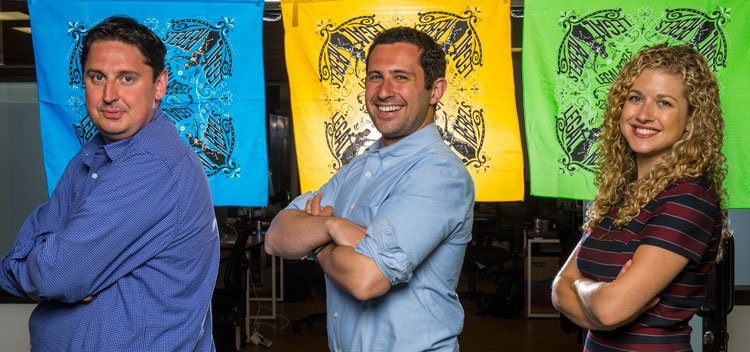By Victor Li

Photo of Pablo Arrendondo, Jake Heller and Laura Safdie of Casetext by Tony Avelar
But what happens when you’re a solo or a small-firm lawyer who operates on a shoestring budget without access to sophisticated (and sometimes prohibitively expensive) legal research tools?
Casetext CEO Jake Heller, 32, thinks the open-sourced and open-knowledge movement can be the great equalizer. Heller saw how open sources and open knowledge had helped sites such as Wikipedia and Yelp compete with and, in many cases, surpass established publications like Encyclopedia Britannica and Zagat.
“It really excited me in terms of how that might apply to law,” Heller says. “We wanted to take this trend of making information more free as well as better.” Heller, who graduated from Stanford Law School in 2010, launched Casetext in 2013 after leaving Ropes & Gray, where he had been an associate. Similar to crowd-sourced sites such as Wikipedia, Casetext relies on users to provide annotations, descriptions, references and tags for cases and statutes.
Three years later, Casetext added the Case Analysis Research Assistant, an artificial intelligence researcher, something that lawyers had told him was impossible.
According to Heller, the idea for CARA came as a result of a “why not?” moment. Heller would ask lawyers what would be in their ideal research tool, and the idea of dragging and dropping legal briefs into a window and receiving a list of relevant cases to read sounded like a pipe dream.
“Most lawyers we spoke to said something like: ‘That’s awesome, but I don’t think it’s possible,’ ” Heller says.
But Casetext’s vice president, Pablo Arredondo, 38, thought it was. Arredondo, a 2005 graduate of Stanford Law School, was a fellow at CodeX—the Stanford Center for Legal Informatics when he met Heller.
“I had previously worked in patent law,” he says. “What I realized was that companies such as Apple or Google had tools that were innovative and beautiful. But the tools used by their outside counsel were not.”
Arredondo was looking for a way to change that, and he was immediately drawn to Casetext. His approach to CARA was to try to unify different informational systems. Drawing on a database of tens of thousands of reputable briefs, CARA allows users to compare their briefs to those of their peers while also guiding users toward cases and arguments that might improve their arguments.
“We wanted to forge a connection between documents in litigation and the research engine itself,” Arredondo says. “Put them together, and they can do powerful things.”
For the company’s chief operating officer, Laura Safdie, 32, its main mission is to give lawyers tools to enable them to function more effectively.
“All of our ideas come from people who tell us things like: ‘I used to hate doing that when I practiced law’ or ‘I wish I had that when I was practicing law,’ ” she says.
Effective representation goes hand in hand with access to knowledge, she says. While clerking at the U.S. District Court for the Southern District of New York, Safdie says she realized how intertwined access to legal research and access to justice are. Safdie worked for U.S. District Judge Paul A. Engelmayer from 2011 to 2012 after graduating from Yale Law School. “It seemed unfair that some people just did not have access to the tools to help them succeed.”
CARA has been very good for Casetext’s bottom line. In March, the company secured $12 million in Series B funding to expand CARA’s machine-learning capabilities and to hire more data scientists and engineers. The company had previously received $7 million in Series A funding. The company also has signed up more than 100 small- and medium-size firms as clients, to go along with about a dozen Am Law 200 firms.
“CARA is a new tool helping us provide best-in-class legal services even more efficiently and effectively,” said Rodger Cole, litigation chair at Fenwick & West, in February when his firm decided to adopt it. “The tool provides tailored, automated analysis aiding the legal research process and benefiting our clients.”
Casetext started out as a four-person company that worked out of Heller’s living room, Safdie says, but growth hasn’t changed them. “Our bandwidth has expanded,” she says. “But we still have the same attitude when it comes to building valuable and innovative technology. We still feel like we can’t move fast enough.”